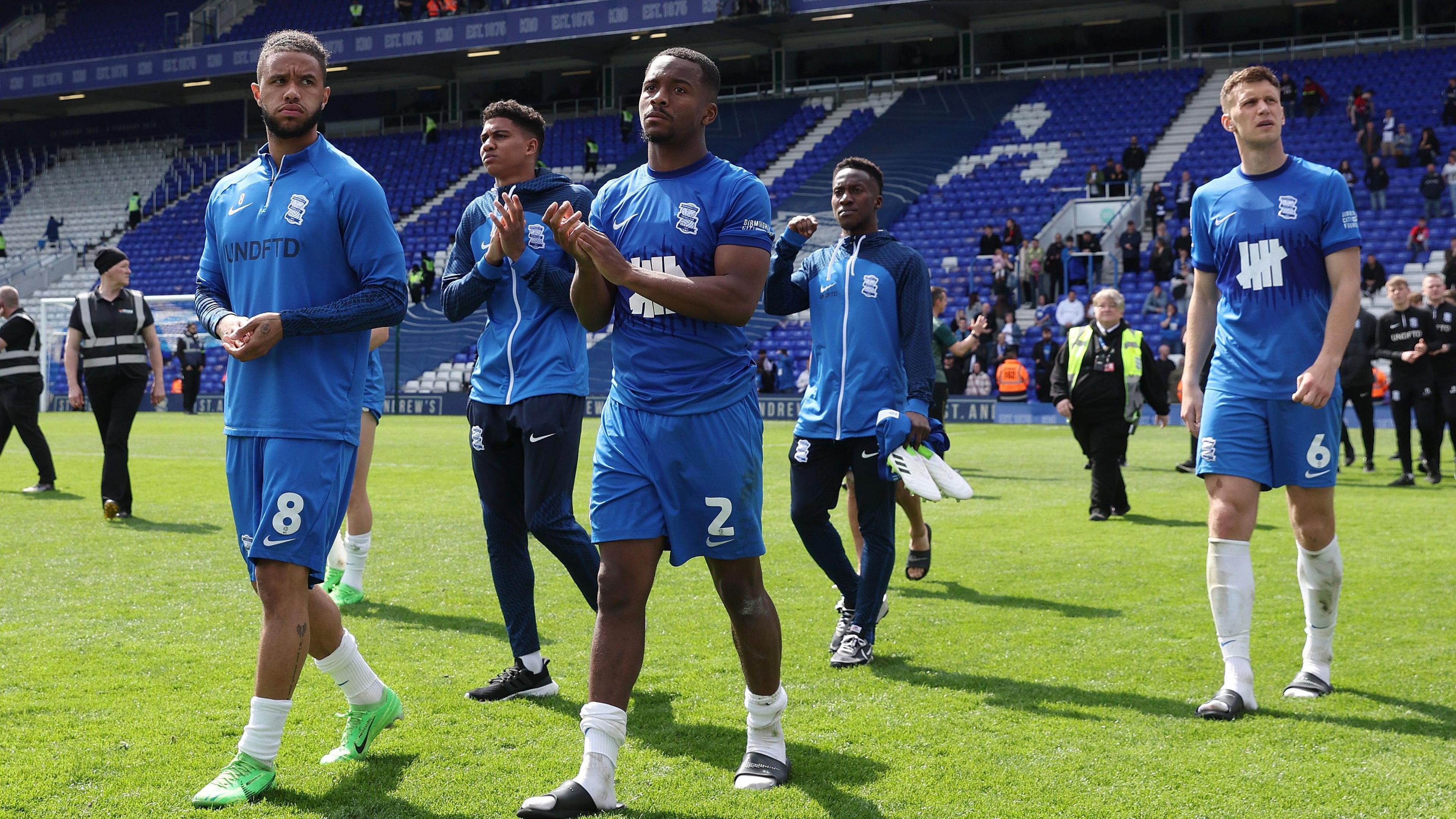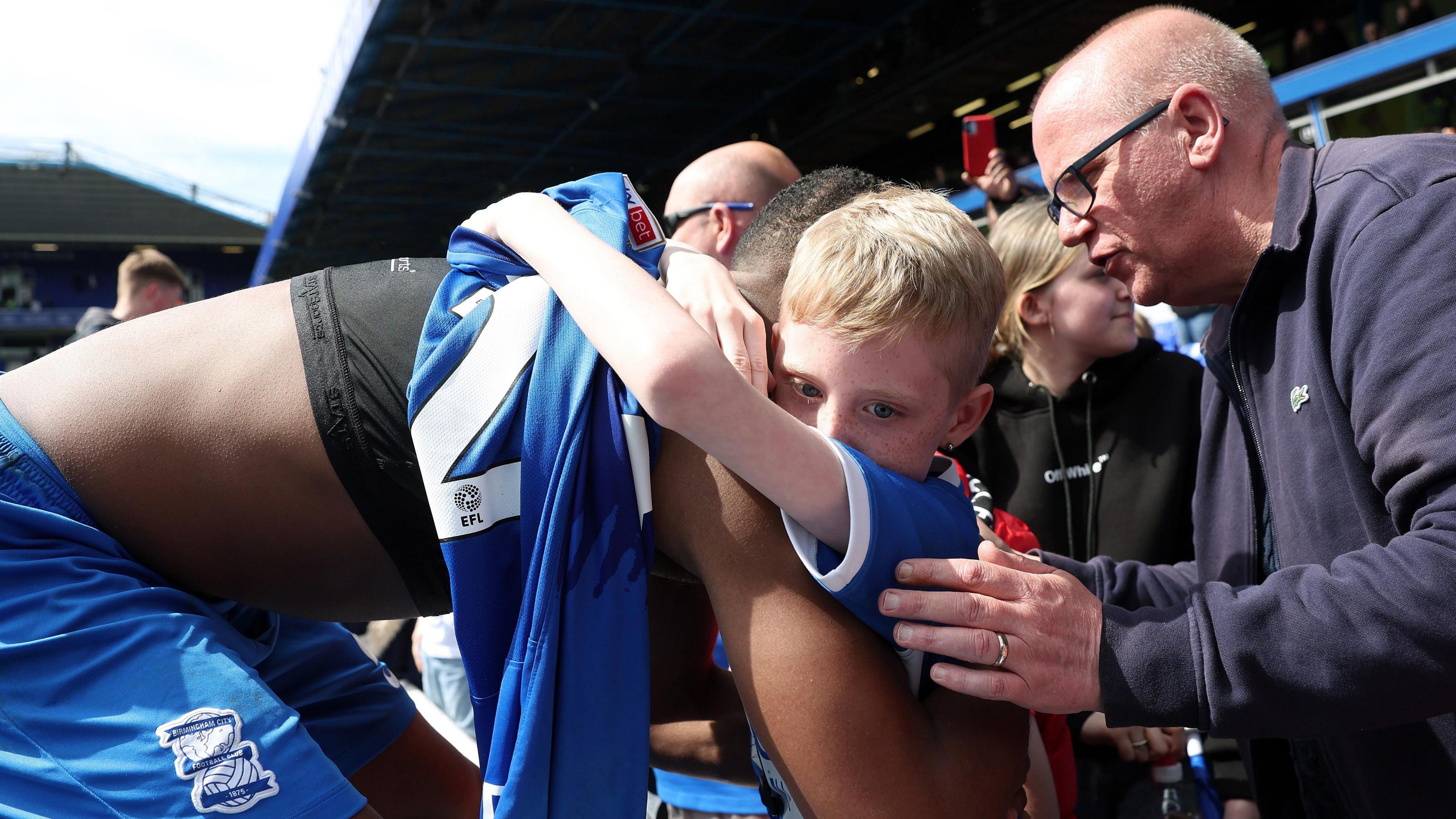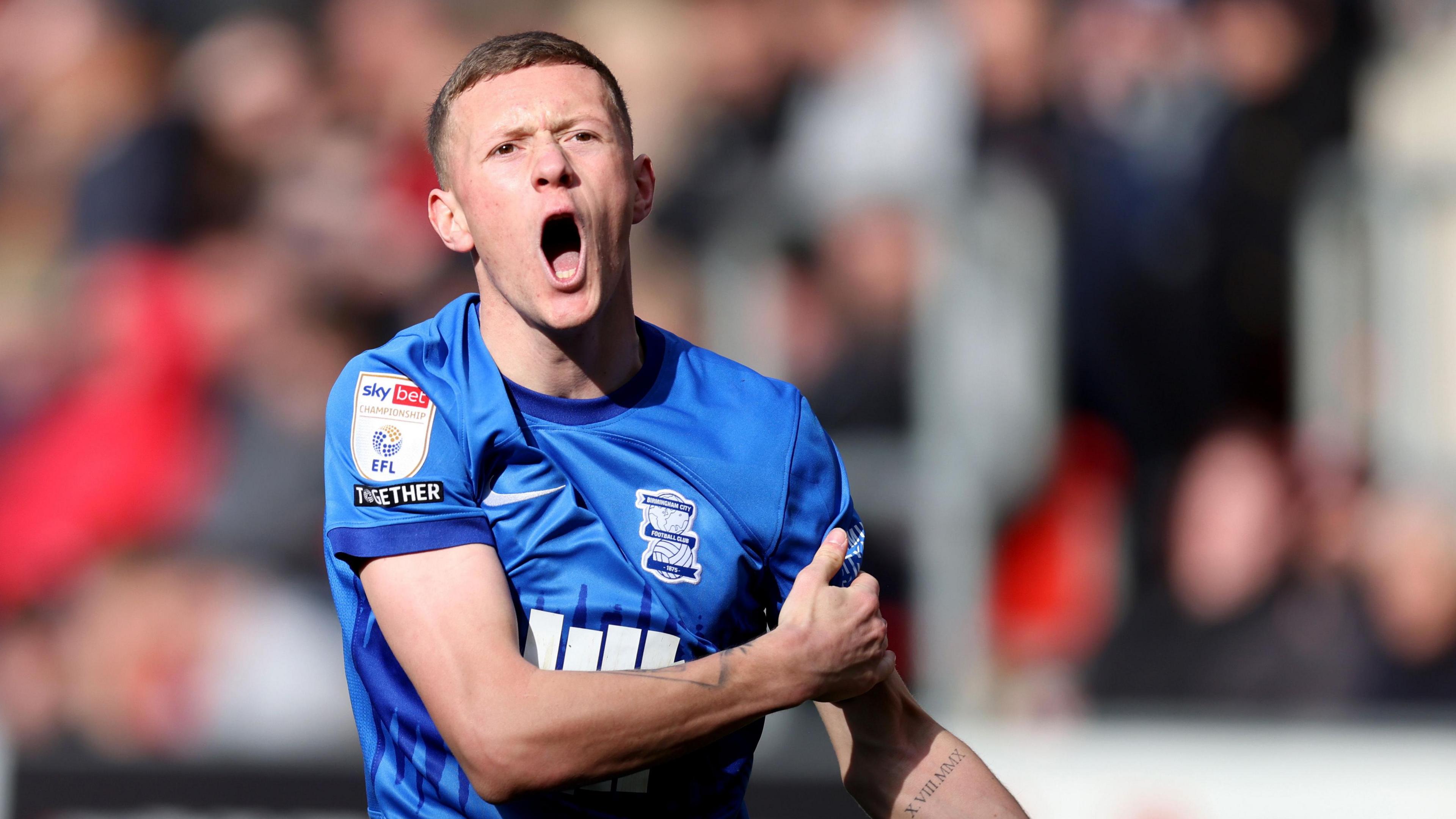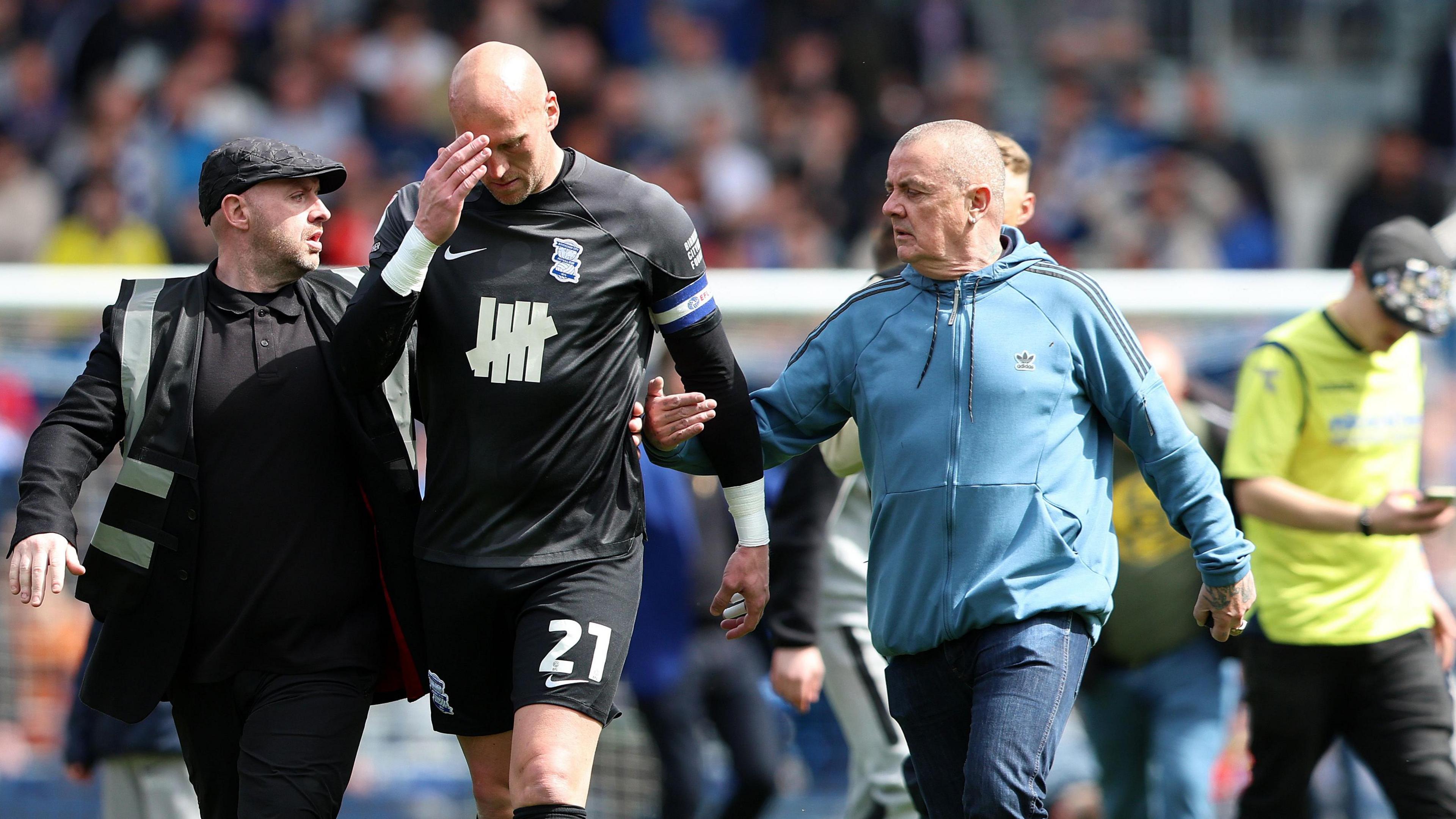Down but not out - Birmingham determined not to let drop define future

Birmingham were last relegated to the third tier in 1994
- Published
Birmingham will start next season in League One. In five years they want to be in the Premier League.
The contrast in the club’s ambition and the reality of relegation this season could not be more stark.
It is a strange situation. While there is anger at an avoidable relegation, fans do believe in the transparent owners, who are prepared to plough money into the club and the city. Yet that positivity cannot disguise a disastrous season.
A 1-0 victory over Norwich could not save them in Saturday's Championship finale as Blackburn, Plymouth and Sheffield Wednesday all won.
Relegation was unthinkable after last summer's takeover, which saw seven-time American football Superbowl winner Tom Brady become a minority owner, but Blues now face a first season in the third tier for 30 years.

Birmingham's Ethan Laird consoled a young fan after relegation
What went wrong?
There is an acceptance the club tried to run before they could walk.
John Eustace was always going to be removed, even he knew it, but chairman Tom Wagner admitted last month he got the timing wrong when replacing him with Wayne Rooney in October.
New owners Knighthead wanted their own man and went for Rooney, a global name to put them on the map, but Eustace offered stability and the club only undermined themselves.
Chief executive Garry Cook's promise of 'no fear football' under Rooney is likely to haunt him for a while longer.
Rooney was never a good fit, the players could not produce what he wanted and he has since complained he never had the backing of the fans.
The former England skipper’s reign lasted just 83 days with two wins in 15 games seeing them slide from sixth to 20th before his inevitable January sacking.
Yet there was still half the season remaining and time to pull away from danger.
Tony Mowbray replaced Rooney and won four of his 10 games before illness forced him away from the club for treatment in February, something no-one could have foreseen, but the ex-Sunderland boss is still due to return for pre-season.
His assistant, Mark Venus, was a reluctant replacement, staying in the role six games - arguably too long.
Ex-boss Gary Rowett was then parachuted back in to St Andrew’s but, while he made them harder to beat he had few options up front, aside from Jay Stansfield, with Lukas Jutkiewicz battling injury and Scott Hogan failing to score since August.
Birmingham have played Hull four times this season, twice in the league and in the FA Cup, and every time had a different manager.
Differing styles, messages and personnel - and the decisions of the board - have all contributed to the downfall.

Fulham loanee Jay Stansfield has been one of the few successes this season
An imbalanced and fragile squad
The commitment of the squad has been questioned this season. Were there enough leaders? Was their fate accepted too quickly? Where was the personality?
Previous ownership Trillion Trophy Asia handed out big contracts and with 13 deals, including loanees, expiring in the summer it is an opportunity to reboot and there is money to spend.
A placid and fragile squad has been too bloated and imbalanced for a long time.
The decision to let defender Kevin Long go to Toronto in January is, in hindsight, a mistake with the side keeping just four clean sheets in 2024 with the backline struggling.
Winter signing Alex Pritchard managed just four appearances because of injury and fellow recruit Andre Dozzell made little impact, while Blues were unable to bring in a much-needed striker in January.
Dion Sanderson's charge for drink driving last month, which saw him stripped of the captaincy, also placed a cloud over the squad.
What happens this summer?
The club needs to regroup but are determined to not let relegation define them or a legacy which will take years to build.
Around £15m will be spent on upgrading the stadium, adding to the extensive work which has already been completed at the dilapidated ground.
The first-team changing room needed updating with showers out of order and cracked tiles, there was no hot water in parts of the stadium, toilets were broken. It was unloved after years of underinvestment.
When the grow lights on the pitch were plugged in earlier in the season it fused the stadium, with the internet and computers crashing, highlighting a previously unknown power issue.
Hospitality areas will be ripped out and transformed to help improve the club’s revenue and high-end caterer Levy, which works at Tottenham and at Wimbledon, has been hired.
Extensive plans include revamping the club shop and linking it to the stadium so it no longer faces the road and a 1,100 capacity fan zone.
The foundations which needed to be laid - including improving HR, scouting and ticketing - are in place with the long-standing, inherited, problems beginning to be resolved.

Blues keeper John Ruddy was approached by a fan after Birmingham's relegation was confirmed
Birmingham's long-term future
Wagner, Brady and the club see the big picture. Despite relegation the pieces of the jigsaw are slotting into place and there is cause to be positive.
The £3bn project to build a new stadium and a Sports Quarter in the city underlines the commitment, desire and scope of their ambition.
Wagner has guaranteed relegation would not delay those plans and he wants to relocate from St Andrew’s within five years. Wagner sees the chance to invest in the city’s future, as well as the club’s.
There is a drive for a younger profile of player, the under-18s and under-21s are top of their respective divisions and Brady’s influence in player welfare has also been felt at their Henley training base.
Yet the board have to learn from their mistakes quickly. They cannot escape the calamity of this season.
Birmingham’s ambition remains to return to the Premier League. They just have to take a detour.